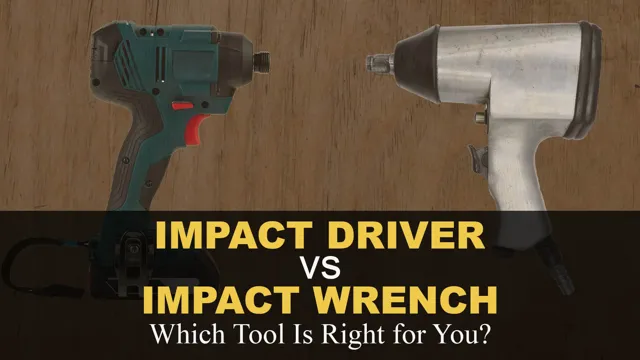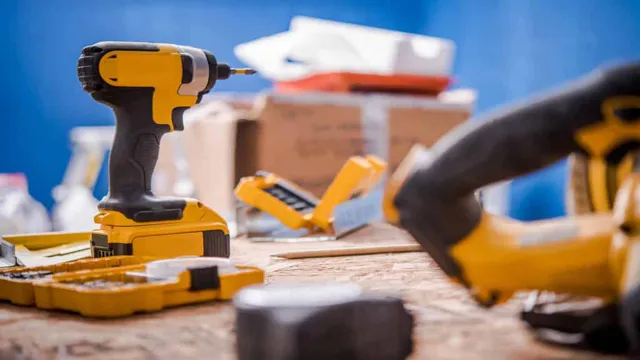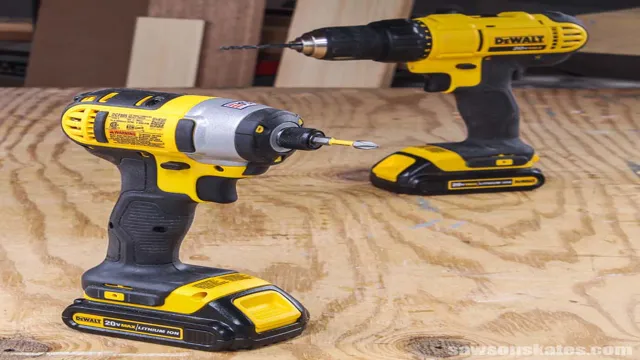Does an Impact Driver Need Special Bits? A Comprehensive Guide

Have you ever wondered what makes impact drivers different from traditional power drills? Sure, both tools are great for DIY projects and professional construction jobs, but the impact driver seems to have an extra oomph that makes it stand out. In this blog, we’ll explore the features that make impact drivers unique and why they should be added to your tool collection. Think of a traditional power drill as a trusty old sedan, and an impact driver as a sleek sports car.
While both will get you from point A to point B, the sports car will get you there faster and with more efficiency. Impact drivers are designed specifically for tough jobs that require more torque and power, such as driving long screws into thick materials like hardwood or metal. One of the main differences between an impact driver and a traditional drill is the rotational force.
While a drill has a constant rotation, an impact driver delivers bursts of high rotational force, also known as “impact”. This impact action makes it much easier to drive screws into tough materials without stripping them or causing any damage. Another advantage of impact drivers is their compact size and lightweight design.
They are much smaller and lighter than traditional drills, making them easier to handle and maneuver in tight spaces. Plus, they have a hexagonal chuck that allows for quick and easy bit changes, so you can switch between drill bits and screwdriver bits without having to waste time searching for the right tool. In conclusion, impact drivers are different from traditional power drills because of their unique rotational force, compact size, and lightweight design.
They are the perfect tool for tough jobs that require more torque and power, and their impact action makes them much more efficient at driving screws into tough materials. So, if you’re looking to upgrade your tool collection, consider adding an impact driver to your arsenal. You won’t regret it!
Impact Drivers vs Drill Drivers
When it comes to impact drivers vs drill drivers, one of the most common questions asked is whether an impact driver needs special bits. The answer is yes, it does. Impact drivers use hexagonal-shaped bits that are specifically designed to withstand the high torque produced by the tool.
The impact driver’s mechanism is built to create repetitive rotational blows that enable it to drive screws into hard materials like wood and metal without breaking, slipping, or stripping the screw heads. Traditional drill drivers use a chuck to hold the bits and rely on rotational force to drive screws and drill holes. As a result, using regular drill bits in an impact driver can cause damage to both the bit and the tool.
Therefore, it’s crucial to use impact-rated bits that are stronger and more durable to withstand the powerful impacts and prevent any potential mishaps. Using the correct bits in your impact driver can ensure efficient and safe results, ultimately prolonging the life of your tool.
Impact Drivers
Impact drivers and drill drivers are often confused with each other, but they are two very different tools. Impact drivers are designed to deliver torque to a fastener with a downward force, using a rotational force to drive the screw or nut into the material. In contrast, drill drivers are primarily used for drilling holes into materials.
While both tools can be used for drilling and driving, impact drivers are better suited for heavy-duty tasks, like driving large screws into hard materials. They are also more compact and lightweight, making them perfect for working in tight spaces. On the other hand, drill drivers are more versatile and can be used for a wider range of tasks, including drilling holes and driving screws.
However, they may struggle with tougher materials, and their size and weight can make them difficult to maneuver. Overall, when deciding which tool to use, it’s important to consider the specific task at hand and which tool will provide the necessary power and precision.

Drill Drivers
Drill Drivers Drill drivers are essential tools for any handyman or DIY enthusiast. They are versatile and can complete a wide range of tasks. However, when it comes to choosing between an impact driver and a drill driver, many people get confused.
The main difference between them is the way they deliver their power. A drill driver has low torque and is ideal for drilling holes and driving screws into light materials. On the other hand, an impact driver is high torque and intended for tough tasks like construction work or driving large, stubborn screws.
An impact driver will be a better choice for heavy-duty jobs, but a drill driver is perfect for less intensive tasks. If you’re unsure which one you need for your project, it’s always best to consult a professional or read the manufacturer’s instructions before making a final decision.
Understanding Impact Driver Bits
If you are planning to use an impact driver for your DIY project or professional work, it is important to know that it needs special bits. Regular drill bits are not suitable for an impact driver because it produces a high torque force and faster rotational speed. The bits that are specifically designed for impact drivers have an overall stronger build that can withstand the pressure and vibration produced by the tool.
The bit’s shank has a hexagonal shape, which allows it to lock tightly in the impact driver’s chuck, preventing slippage. Additionally, impact driver bits have a torsion zone that flexes slightly to absorb the energy produced by the tool. This feature dramatically reduces the risk of breaking the bits, making them last longer than regular drill bits.
Therefore, investing in impact driver bits will not only improve your work efficiency but also save you time and money in the long run.
Hex Shank vs Round Shank
If you’re in the market for a new impact driver, you may be wondering whether you should choose a hex shank or a round shank for your driver bits. Both types of shanks have their pros and cons, so it’s important to understand the differences so you can make an informed decision. Hex shanks are becoming increasingly popular because they provide a better grip and more torque, which can make it easier to drive screws and other fasteners into tough materials like hardwood or metal.
However, round shanks are still common and may be a better choice if you need to use your bits with a drill or other tool that doesn’t accept hex shanks. Ultimately, the right choice for you will depend on your specific needs and preferences, so make sure to consider all of the factors before making a purchase.
Material Composition
When it comes to impact driver bits, understanding their material composition is vital. The most common materials are steel, titanium, and cobalt, each with its unique properties. Steel is the most affordable and widely used, offering durability and strength for most tasks.
However, titanium bits are more resistant to heat and wear, making them an ideal choice for high-stress jobs. Cobalt bits are the most expensive but are also the most robust and long-lasting, making them suitable for heavy-duty tasks. Additionally, some bits have coatings such as black oxide, which increases their lifespan and reduces friction.
Ultimately, the material composition of the bit you choose will depend on the job you need to complete. Whether you’re a DIY enthusiast or a professional, selecting the right bit can make all the difference in the success of your task.
Specialty Bits
If you’re wondering if you need special bits for your impact driver, the answer is both yes and no. While technically any standard driver bit will fit into an impact driver chuck, it’s recommended to use bits that are designed specifically for impact driving. These specialty bits are constructed to withstand the harsh, high-torque environment of an impact driver without breaking, stripping, or wearing down quickly.
The unique design of impact-rated bits allows them to absorb the sudden forces created when your impact driver is in use. Using standard bits in an impact driver can put undue strain on both the bit and the tool, leading to premature wear and tear. To get the most out of your impact driver, invest in impact-rated bits – it just might save you money in the long run.
Masonry Bits
Masonry bits are specialty bits designed to drill through hard materials such as concrete, brick, and stone. They come in various sizes and shapes, depending on the type of material being drilled and the size of the hole needed. These bits are made of high-speed steel, tungsten carbide, or diamond-coated tips to provide superior hardness and durability.
Using the right masonry bit for the job can save time and effort, and ensure a precise and clean hole. With regular use, masonry bits can become dull, making them less effective. It is important to invest in high-quality masonry bits to ensure a longer lifespan and better performance.
Overall, masonry bits are a must-have tool for any DIY enthusiast or professional builder working with tough building materials like concrete and brick.
Spade Bits
Spade bits are one of the most commonly used specialty bits in woodworking. They have a distinctive shape that resembles a spade or paddle, which allows them to bore large, flat-bottomed holes quickly and easily. Spade bits come in a range of sizes, and they are ideal for making holes in softwoods and composite materials like particleboard or plywood.
They are also perfect for drilling holes for cable runs, as they leave a clean hole that can be easily cleaned up with a chisel or sandpaper. Using a spade bit is relatively straightforward, but it does require some attention to detail. It’s important to choose the right size bit for the job and to maintain a steady pressure on the drill.
If you’re working on a project that requires precision, it may be necessary to use a drill press with a fence to ensure that your holes are drilled in the correct position. Overall, spade bits are an essential tool for any woodworking enthusiast, and with a little practice, they can help you create clean, precise holes time and time again.
Step Bits
Step bits are a type of specialty bit that is particularly useful for enlarging holes in thin materials, such as sheet metal or plastic. Unlike standard drill bits or hole saws, step bits can be adjusted to create different sized holes without the need for multiple tools. The design of a step bit features a conical shape with a series of gradually increasing steps that allow for larger diameters.
This makes them an excellent choice for tasks that require precise drilling, like installing electrical components or creating openings for plumbing fixtures. Additionally, step bits are typically made from high-speed steel or cobalt and can be used with both hand-held and stationary drills, making them a versatile addition to any toolbox. If you’re looking to take on a home improvement project or tackle a DIY repair, consider the benefits of using a step bit to make your job easier and more efficient.
Conclusion
In conclusion, an impact driver may not necessarily need special bits, but using the right ones can definitely enhance its performance. Just like a chef wouldn’t use a butter knife to fillet a fish, using the appropriate bits for an impact driver will ensure precision, speed, and durability. So, invest in quality bits and make your impact driver work smarter, not harder.
“
FAQs
What type of bits can be used with an impact driver?
Impact drivers are compatible with hexagonal bits that have a quick-release mechanism.
Can regular drill bits be used with an impact driver?
Regular drill bits are not recommended for use with an impact driver as they may break due to the torque generated by the driver.
Are impact driver bits different from regular bits?
Impact driver bits are designed to withstand the high torque produced by the driver, and are usually made of tougher materials than regular drill bits.
Do I need to use special screws with an impact driver?
No, special screws are not required for use with an impact driver. However, it is recommended to use screws that are compatible with the size and type of bit being used.
Can impact driver bits be used with a regular drill?
Yes, impact driver bits can be used with a regular drill, but they may not provide the same level of performance as when used with an impact driver.
Can I use an impact driver to drill holes?
While an impact driver can be used for light-duty drilling, it is not recommended for heavy-duty drilling as it may not provide the necessary precision or control.
What is the difference between an impact driver and a regular drill?
An impact driver delivers high torque outputs in short bursts, making it ideal for driving screws and bolts into tough materials. A regular drill provides a constant torque output and is best suited for drilling holes.



